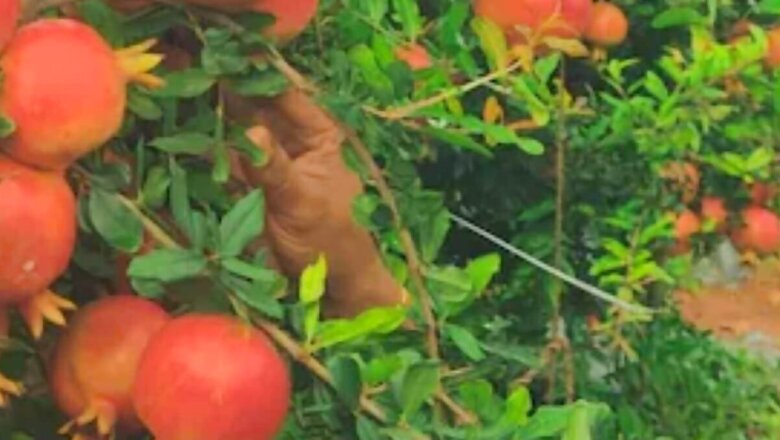
views
A 45-year-old farmer named Ramesh from the Hullehalli village, Kadur Taluk, Chikmagalur District, Karnataka is currently in the headlines. According to the Local 18 Karnataka, he spent Rs 20 Lakh on the cultivation of a pomegranate crop on a land of 8 acres. When Ramesh sold that bumper crop in the market, he earned Rs 95 Lakh. This is a major accomplishment for Ramesh as the Hullehalli village has been suffering from drought since 2023. Ramesh had cultivated pomegranate for the first time in his farming career. To date, he has planted 2400 plants in his field, and the bumper pomegranate crop this time has exceeded the returns in comparison to all plants. Farmers in the Hullehalli village say that coffee and pomegranates are being exported to Tamil Nadu, Bengaluru, Chennai, Maharashtra, Sri Lanka and Bangladesh. Pomegranates grown by Ramesh are being sold at Rs 160 per kg. Few people have cultivated pomegranates in Hullehalli and other neighbouring villages but no one has benefitted like Ramesh. All of them have suffered losses in farming.
More about pomegranate farming
According to the Niche Agriculture, Pomegranate farming is an important agricultural practice in India. It is because India is one of the largest producers of pomegranates in the world. The profitability of pomegranate farming in India depends on many factors. The profitability is driven by factors such as the quality of the soil, climate, cultivation practices and market demand.
There are several Advantages of pomegranate farming which include-
1. High demand: Pomegranate is a popular fruit with an increasing demand in both domestic and international markets. This makes it a profitable crop to grow.
2. Long shelf life: Pomegranates have a long shelf life, which means they can be stored and sold over a longer time.
3. Nutritional value: Pomegranates are a storehouse of vitamins, minerals, and antioxidants, making them a nutritious food choice. This also adds to the marketability of the fruit.
4. Low maintenance: Pomegranate trees are relatively low maintenance, requiring less water and fertiliser than many other fruit trees.
5. Drought-resistant: Pomegranate trees are drought-resistant, making them suitable for cultivating in areas with limited water resources.

















Comments
0 comment